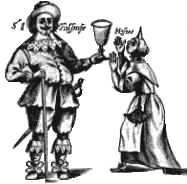Prose and verse in Shakespeare
If the spectators in Shakespeare's theatre were so delighted with the gorgeousness of language, why did Shakespeare sometimes write in prose? Sometimes, as in Henry IV, Part One, there seems a clear division between the formal verse of the court and the rambunctious prose of the tavern. . .
But there are as many exceptions to this neat division as there are instances when it is accurate. Hamlet's powerful speech "What a piece of work is a man" (2.2.303-16) is delivered entirely in prose, and what are we to make of a play like The Merchant of Venice, in which the prosaic, business-obsessed characters of Venice usually speak in verse and the poetic, imaginative characters of Belmont often speak in prose?
One consistent difference seems to be that verse is used when there are passages of high feeling and increased intensity, while prose is often the language of wit and play.
The rhythm of prose
Shakespeare's prose is as masterly as his verse, and often even more dense with meaning (check the footnotes of a passage of prose, and see if there are fewer than for verse). Prose is the vehicle for many of Shakespeare's wittiest characters: Falstaff, Beatrice, Rosalind, the Porter in Macbeth, Autolycus in The Winter's Tale, and many others.
While most of the memorable passages from the plays are in verse, many memorable scenes are in prose, or a mixture of the two: prose is one of the many ways in which Shakespeare keeps the rhythmic counterpoint* of his language alive.
Footnotes
-
The verse within the prose
One of the distinctions that it is possible to make between Shakespeare's use of prose and verse is that the prose tends to be chattier, and to be in passages that will move swiftly.
Just to confuse things further, there are some passages where it is unclear whether Shakespeare intended verse or prose. Sometimes the compositor setting the type needed to save space, so printed verse as prose, and sometimes he needed to stretch the text out further, so broke prose into uneven verse. The speeches of Lear in his madness are usually printed as irregular verse, but they may originally have been prose.
